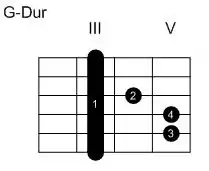barre
English

Noun
barre (plural barres)
- (ballet) A handrail fixed to a wall used for ballet exercises.
- (music) Short for barre chord.
Verb
barre (third-person singular simple present barres, present participle barring, simple past and past participle barred)
- (music) To form a barre chord on an instrument.
Basque
Etymology
From Proto-Basque *baRe, probably of imitative origin.
Pronunciation
- IPA(key): /bare/, [ba.re̞]
Declension
| Declension of barre (inanimate, ending in vowel) | |||
|---|---|---|---|
| indefinite | singular | plural | |
| absolutive | |||
| ergative | |||
| dative | |||
| genitive | |||
| comitative | |||
| causative | |||
| benefactive | |||
| instrumental | |||
| inessive | |||
| locative | |||
| allative | |||
| terminative | |||
| directive | |||
| destinative | |||
| ablative | |||
| partitive | — | — | |
| prolative | — | — | |
Danish
Pronunciation
- IPA(key): /barə/, [ˈb̥ɑːɑ]
Inflection
Further reading
 barre on the Danish Wikipedia.Wikipedia da
barre on the Danish Wikipedia.Wikipedia da
Dutch
French
Etymology
From Middle French barre, from Old French barre (“beam, bar, gate, barrier”), from Vulgar Latin *barra, of uncertain origin. Perhaps from Old Frankish *bara (“bar, beam, barrier, fence”), from Proto-Germanic *barō (“beam, bar, barrier”), from Proto-Indo-European *bʰerH- (“to strike, pierce”).
If so, then cognate with Old High German para, bara (“bar, beam, one's cherished land”), Middle Dutch bāre, baer (“bar, barrier, rail”), Old Frisian ber (“attack, assault”), Swedish bärling (“a spoke”), Norwegian berling (“a small bar in a vehicle, rod”), Latin forus (“gangway, plank”), Russian забо́р (zabór, “fencing, paling, fence”), Ancient Greek φάρος (pháros, “piece of land, furrow, marker, beacon, lighthouse”).
An alternative etymology derives Old French barre and Vulgar Latin *barra from a Celtic source related to Breton barri (“branch, twig”).
Doublet of bar.
Pronunciation
- IPA(key): /baʁ/, /bɑʁ/
audio (file)
Noun
barre f (plural barres)
- bar, cake, ingot
- (typography) Clipping of barre oblique: the slash mark ⟨/⟩
- (typography) Clipping of barre de fraction: the fraction slash ⟨⁄⟩
- (typography) Clipping of barre inscrite: the bar diacritics ⟨̵⟩, ⟨̶⟩, ⟨̷⟩, and ⟨̸⟩
- (typography) Clipping of barre verticale: the pipe mark ⟨|⟩
- (typography, improper) Clipping of barre oblique inversée: the backslash ⟨\⟩
- (nautical) helm, tiller
- (heraldry) bend sinister
Derived terms
- à la barre
- barre de mesure
- barre de recherche
- barre d'outils
- barre fixe
- barre inscrite
- barre oblique
- barre oblique inverse
- barre oblique inversée
- barre russe
- barre transversale
- barre verticale
- barres asymétriques
- barres parallèles
- barreur
- coup de barre
- point barre
- redresser la barre
- se taper des barres
- tenir la barre
Further reading
- “barre”, in Trésor de la langue française informatisé [Digitized Treasury of the French Language], 2012.
Anagrams
Latin
Norman
Etymology
(This etymology is missing or incomplete. Please add to it, or discuss it at the Etymology scriptorium.)
Pronunciation
Audio (Jersey) (file)
Synonyms
- (crossbar): barre dé travèrs
Norwegian Bokmål
Derived terms
References
- “barre” in The Bokmål Dictionary.
- NAOB
Norwegian Nynorsk
Derived terms
References
- “barre” in The Nynorsk Dictionary.
Old French
Etymology
From Vulgar Latin *barra.
Noun
barre f (oblique plural barres, nominative singular barre, nominative plural barres)
- bar (solid, more or less rigid object with a uniform cross-section smaller than its length)
- 12th Century, Unknown, Raoul de Cambrai:
- Elle a l'us clos et fermet a la barre.
- She shut the door and closed it using the bar
-
Derived terms
Portuguese
Pronunciation
- (Brazil) IPA(key): /ˈba.ʁi/ [ˈba.hi]
- (Rio de Janeiro) IPA(key): /ˈba.ʁi/ [ˈba.χi]
- (Southern Brazil) IPA(key): /ˈba.ʁe/ [ˈba.he]
- (Portugal) IPA(key): /ˈba.ʁ(ɨ)/
- Rhymes: (Brazil) -aʁi, (Portugal) -aʁɨ
- Homophone: varre (Porto)
- Hyphenation: bar‧re
Verb
barre
- inflection of barrar:
- first/third-person singular present subjunctive
- third-person singular imperative